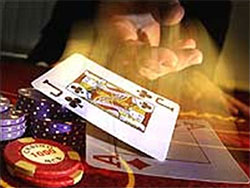Pathological Gambling Definition
- Pathological gambling: For a small but significant number of people, gambling seriously harms all aspects of their lives. People with gambling problems this severe are unable to control the urge to gamble, despite the harm it causes. They are more likely to use gambling to escape from problems and to get relief from anxiety.
- Pathological gambling: a critical review / Committee on the Social and Economic Impact of Pathological Gambling and Committee on Law and Justice, Commission on Behavioral and Social Sciences and Education, National Research Council.
- Compulsive and habitual gambling can destroy a person's life. He likely suffers personal problems and financial ruin, with problem gambling sometimes leading to a life of crime.
- Manifestations observed include pathological gambling, compulsive shopping, binge eating, and compulsive sexual behaviour (hypersexuality springer Prevalence of pathological gambling among the German population is estimated to be 0.2–0.5%.
- Pathological Gambling Definition
- Pathological Gambling Definition Meaning
- Pathological Gambling Definition Articles

Also found in: Dictionary, Thesaurus, Medical, Encyclopedia.
Pathological gambling is an uncontrollable compulsive urge to continue gambling despite the financial and social toll it may take on the person's life. The individual may increase his/her gambling habits to the point of financial distress, often sacrificing commitments and responsibilities to get more money and gamble it.
Pathological Gambling Definition
Gambling
Pathological Gambling Definition Meaning
Want to thank TFD for its existence? Tell a friend about us, add a link to this page, or visit the webmaster's page for free fun content.
Link to this page:
Pathological Gambling Definition Articles
As states have moved from merely tolerating gambling to running their own games, as communities have increasingly turned to gambling for an economic boost, important questions arise. Has the new age of gambling increased the proportion of pathological or problem gamblers in the U.S. population? Where is the threshold between 'social betting' and pathology? Is there a real threat to our families, communities, and the larger society? Pathological Gambling explores America's experience of gambling, examining:
- The diverse and frequently controversial issues surrounding the definition of pathological gambling.
- Its co-occurrence with disorders such as alcoholism, drug abuse, and depression.
- Its social characteristics and economic consequences, both good and bad, for communities.
- The role of video gaming, Internet gambling, and other technologies in the development of gambling problems.
- Treatment approaches and their effectiveness, from Gambler's Anonymous to cognitive therapy to pharmacology.
This book provides the most up-to-date information available on the prevalence of pathological and problem gambling in the United States, including a look at populations that may have a particular vulnerability to gambling: women, adolescents, and minority populations. Its describes the effects of problem gambling on families, friendships, employment, finances, and propensity to crime.
How do pathological gamblers perceive and misperceive randomness and chance? What are the causal pathways to pathological gambling? What do genetics, brain imaging, and other studies tell us about the biology of gambling? Is there a bit of sensation-seeking in all of us? Who needs treatment? What do we know about the effectiveness of different policies for dealing with pathological gambling? The book reviews the available facts and frames the intriguing questions yet to be answered.
Pathological Gambling will be the odds-on favorite for anyone interested in gambling in America: policymakers, public officials, economics and social researchers, treatment professionals, and concerned gamblers and their families.